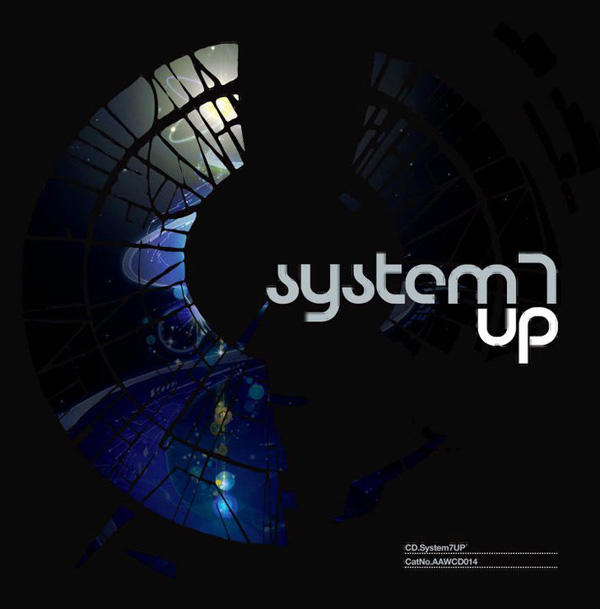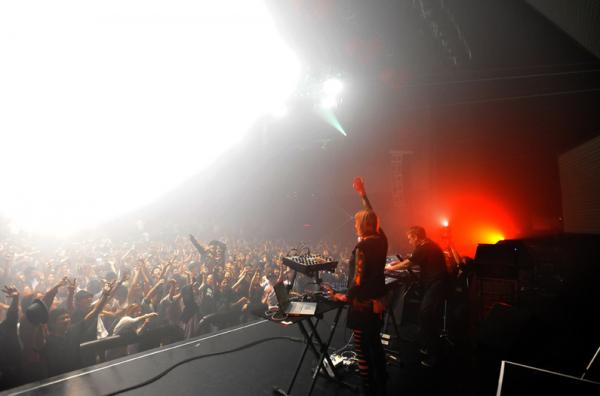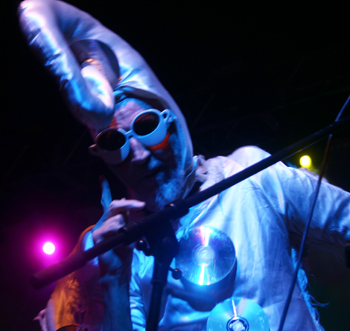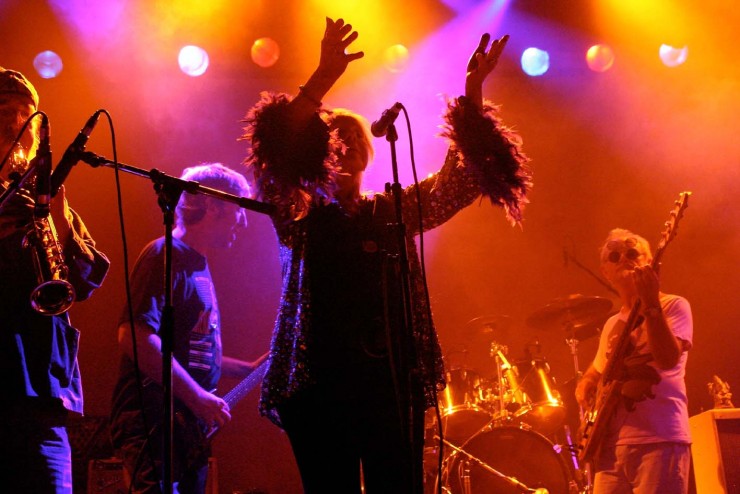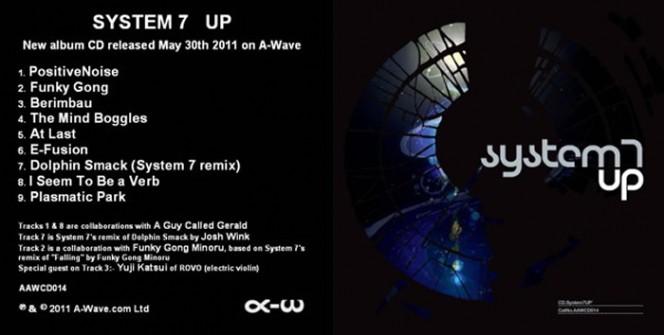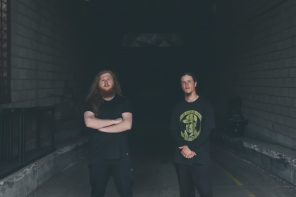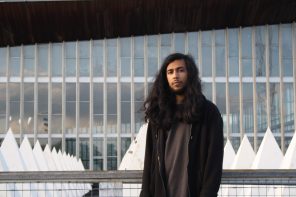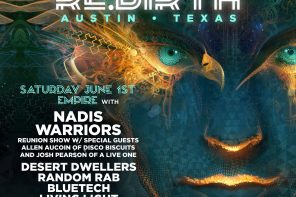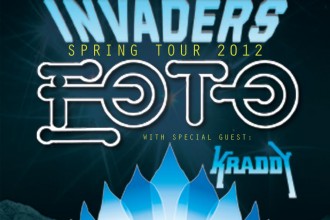Steve Hillage is a psychedelic rock and electronic music pioneer. The guitarist and producer is best known for his work with the theatrical band Gong and his techno project System 7. Formed in the 70s, Gong recently reunited, releasing a new album and touring last year. The first System 7 record came in August 1990, and since then they have released 11 albums (Including my favorite Phoenix from 2007) and a string of singles with some classic remixes. One of the few trance groups to feature the electric guitar (with the sound often heavily processed), and to have a female synth player, you can count on the duo for inspiring dance tracks and deep ambient voyages. Their live set notoriously takes things to a different level, with jams from Steve laid over beats and keys laid down by his partner in crime Miquette Giraudy.
I discovered Hillage when Ott named him as an influence in our interview for my first LiS story.. I was instantly hooked by his exploratory spirit and smooth fusion of diverse elements and genres. We cannot wait for his new album, UP, out May 30th on his label a-wave. We were lucky enough to snag an interview with this electric guitar legend who has been writing riffs, making beats and blowing minds for decades. His love of creating and performing music has kept him in the game and his unique, uncompromising style has kept him on the cutting edge of underground culture. He is a trendsetter who has had a massive impact on so many of our favorite artists simply by doing his own thing his own way.
The new material sounds great, check out clips in the preview below.. Stream / Download a track from their last joint as you read the interview:
System 7 – Makimura – Space Pilot (Collaboration with Mito)
LiS: What keeps you interested in the dance music scene at this point, what will always be exciting about it?
Steve Hillage: The interaction with the crowd at a dance event, either playing live or Djing, I find deeply satisfying and a more honest energy interchange than the conventional rock band/concert format. Most all the music I listen to at home or in the car is dance music and I’m always hunting for interesting new tunes in the techno, tech-house and trance area. As we’ve been doing it for more than 20 years now I suppose dance music is closest to my musical DNA. I love the abstract sonic sculpture of dance music. As to how it will develop in the future – who knows? The fact that there is an ever-present element of turmoil is another thing I like about dance music.
Your work has always been experimental and complex but seems to come from and build out of the basic, capturing rhythms and emotions that appeal to so many. How do you manage this?
I just make music the way I hear it – and I’m always looking for a good groove. Playing live always helps, as I’m especially looking for grooves that can rock a large crowd in an interesting way, not just a cheap lowest common denominator thing – and of course this applies a lot to our dance music project System 7.
Tell us about a favorite experience playing live with either Gong or System 7.
We had a particularly special experience with System 7 at the Sacred Music Festival in a major Japanese temple at Miyajima Island near Hiroshima, Japan in 2001. It was by the sea. The main stage was in the temple and the audience area was on a huge floating pontoon over he water. We were chosen to represent electronic dance music in a wide blend of world music and instrumental styles and our set on the main stage really struck a chord with the crowd and helped to get us well established in Japan. After a deeply moving closing ceremony made by Tibetan monks, their Lama made a closing speech thanking everybody and wished to give particular thanks to the makers of “that exciting techno music”. He explained that he had been on the dancefloor with abbot of the temple and was most impressed by the joyful effect our music had on the people and said that he and the abbot had discussed that this music was “similar to some of our mantras”. What a compliment!
System 7 is a collaboration with Miquette Giraudy, producer and synth player. What does she bring to the project and the stage to complement your guitar and production?
Miquette brings a wonderful feminine quality to the electronic sounds she creates. She also worked with me in the 70s in Gong and the Steve Hillage Band; her playing and my guitar work together in a unique way. In dance music terms, if System 7 is “techno-trance”, Miquette is more techno and I’m more trance.
We’re excited about the new album, what can you tell us about it – What kinds of equipment did you use to make it? Where did the creative energy come from this time?
Yes we’re all ready to go with our new System 7 album UP. We wrote a lot of the tracks in Berlin, where we’ve been strongly impressed by the positive nature of the culture and in particular the techno scene. The crowds at the clubs tend to be quite joyful and happy while at the same time totally digging the specialist Berlin techno sound in an educated way. This positivity we found very inspiring and has directly led to us titling the album UP.
Two of the tracks are collaborations with A Guy Called Gerald who lives and works in Berlin, and we’ve also included our remix of a Josh Wink track. We’ve also got a single coming out for the track “PostiveNoise” with great remixes from Carl Craig and Japanese techno artist A.Mochi. A new video clip is in the works that will go up on YouTube when it’s finished. The tempo’s a bit slower than the last album Phoenix and the orientation is a bit more techno – but it’s still got our special System 7 spacey sound. In some ways it’s a bit like our earlier albums in the early nineneties – but with bang-up-to-date production. Technically:- Logic, Protools, Reason, Camel Audio, Native Instruments – all the usual suspects!
What is that guitar that you play on stage? Do you use it in the studio as well? What advantages does it have over a conventional axe?
I’ve been playing the Steinberger GL2T since 1986 both live and in the studio. I love it. I recently got a new one called a Steinberger Transcale – that is great too and you can tune it lower. The Steinberger is the perfect techno guitar – I love the way it doesn’t have that “rock” look. Sounds great, stays nicely in tune, and it’s nice and compact to carry as cabin baggage on a plane. It’s also the best guitar I’ve ever found for making the special Gong “glissando” effect, stroking the strings with echo and compression.
You are a pioneer of the trance-fusion movement that has become so popular in America through bands like The Disco Biscuits. Why aren’t there more instrumental bands making electronic music in Britain when you guys have so many great electronic music producers and rock bands and an underground party scene hungry for it?
If you are asking about rock bands that play a kind of rock/dance fusion or rock music influenced by the dance music scene, I think what you are really seeking here is pretty rare in the UK. The Egg are a very interesting band – I like them – and they are popular on the party circuit but in no way would I describe their music as “IDM”. On the other hand other rock bands in the UK that have been successful at dance music influenced rock include Primal Scream (particularly with Screamadelica) and more recently The Music. But there is no “jam band” scene here, it’s a very American thing, although in Japan there is a small jam band scene, and we have links with it. Especially a band called ROVO – a kind of progressive jam band with an ace electric violinist called Yuji Katsui who has guested on the Gong 2032 album and also on our new System 7 album.
Why do British people, and all people, love and exploit the absurd? What is it about the silly, the bizarre, the exaggerated that is so fascinating and entertaining and what role does this play in the pageant of Gong?
I can’t really say why, but as someone born in London I’ve grown up in an atmosphere of British humor – starting with the Goons – and a great respect for eccentricity. The absurd and the bizarre – I love it! The humor aspect is very important in the special cultural cocktail that is Gong.
The theatrical aspect of Gong makes it a unique collaboration and performance vessel. How big a part in that do you have? Who writes that mythology, or is it a collaborative effort?
Daevid Allen is the founder of Gong and the instigator of the mythology. He comes up with a the basic mythological parameters and the n we all bear this in mind when we’re collectively creating the music. Then Daevid fine tunes the mytho aspect when he finalizes his lyrics. You might be interested to know that the concept of the year 2032, which was the mytho basis of our most recent album, has been around since around 1970, but this time we decided to make it a heavy feature.
How was touring with them again in the fall, will you guys be playing again soon?
We did around 60 shows in 2009 and another 20 shows in 2010. It was great – a rekindling of our old friendships particularly between Daevid and Gilli and myself and Miquette. We only did one show in the USA and that was at the prog rock festival Nearfest. It was a great festival but I had the impression that a large part of the audience just didn’t “get” Gong. We don’t really see ourselves as a “prog” band – psychedelic yes but I think we’re too wacky to work for a lot of real prog fans. That’s just the way it is….
What are your thoughts on the role of spectacle in live music performance, does it distract from the music and become the focus at times or is it all part of a dynamic show?
Gong isn’t exactly choreographed, but Daevid and Gilli get through quite a few costume changes and we need to work the live sets around costume change points when they can go off stage to change. As of now video has become very important and we have a great light-show/video operator with Gong called Jasper Johns. We also use video a lot with System 7 and have another great video operator called Antonio Pagano. We’ve had some really cool animation video clips made in Japan, and the same people did one for Gong too, using Daevid’s drawings.
What would you tell a young kid on tour for the first time, immersed in a world of music and spirituality but also ego, drugs and excess?
I wouldn’t presume to tell them anything unless they asked me a specific question. If they asked me how I’ve managed to keep going for a long time I would say ‘yeh party as much as you like but there comes a point where you really need to pay attention to your health.’ And if you’re making great music please “stay with your thing”.
If an American electronic music fan was traveling to Europe to experience a music festival, which would you recommend they go to and why?
Glastonbury of course! This is still the biggest and the best festival with a complete spread of musical styles and counterculture. There really is something for everybody there, plus it’s in a part of England with a very strong mystical history, a pretty magical place. I had some involvement with the Glastonbury organization in the 1970s as the festival was growing and I also had a big involvement in 1995 when I persuaded Michael Eavis (the main organizer) to have an official dance music stage for the first time. We’ve played there with System 7 on 15 consecutive occasions and also played a Gong set in 2009.
What goals do you have for projects and tours in the future? I see you have some festivals lined up for the summer, what’s happening?
From May of this year onwards we’re going to do quite a few System 7 shows around the release of our new album including Glastonbury, Sonica and other festivals, and a tour in the autumn. We’d love to come a play some more System 7 shows in America but recently we don’t seem to find any workable proposals. Pity. I also have some possible record production projects and next year we might do some more Gong gigs and then I intend to take the second half of the year off – partly to reflect on the calendrical importance of 2012 and partly to open myself up to new creative impulses. Who knows what will happen after that!
System 7 describes the tracks on the new album:
1. PositiveNoise – This opening track is one of our collaborations with A Guy Called Gerald. The intro section is taken directly from a live recording we made at Gerald‘s Berlin studio while writing this track. We’re really happy with the combination of melodic chords and groove and Gerald‘s throbbing bass sound.
Funky Gong
Funky Gong Minoru plays guitar and DJs with the Japanese band Joujouka also with our friend DJ Tsuyoshi Suzuki. This track is based on our remix of Funky Gong’s track “Falling” and we came up with this great groove that we were keen to develop into a track for our album. This track mixes metal guitar with a definite electro edge. We’ve titled it using Funky Gong‘s name and the title will intrigue fans of our band Gong.
3. Berimbau – The berimbau is a traditional Brazilian musical instrument used in combination with the wonderful Capoeira martial arts and dance moves. On this track we used samples of the berimbau with a deep tribal tech groove to create something that we find quite original. At one point we quote from the old System 7 track “7:7 Expansion” (a collaboration with Youth) that also used a berimbau sample. In addition we have a guest performance from Yuji Katsui of Japanese band ROVO on electric violin – he’s also a berimbau fan and he plays one.
The Mind Boggle
This is perhaps the most intense track on the album imbued with a heavy bubbling techno groove throughout, together with lots of pulsating echo guitar. The long intro build up starts with orchestral chords and dark harmonies.
At Last
A deep techno groove coupled with large amounts of Steve‘s trademark echo guitar. At one point in the multi-layered guitars we use a sample from one of our own tracks “Sirenes” (collaboration with Laurent Garnier).
E-Fusion
Very much based around Miquette‘s dreamy EMS synthesizer loops this is in some ways the most psychedelic track on the album. The long outro is somewhat reminiscent of our ambient classic “Rainbow Dome Music”. It should be noted that while this System 7 album doesn’t actually include a downtempo track, several of the album tracks have long intros and outros and this provides a representation of the ambient aspect of our sound.
7. Dolphin Smack (System 7 remix) – “Dolphin Smack” is a track by Josh Wink with a long ambient middle drop section that we started to love to mix in with other tracks in our DJ sets and even in one spot in our live set. While in Berlin we had the idea that, if we made a System 7 remix of Josh‘s track, as its elements had worked so well in our sets it could work really well on our album. We contacted Josh and he liked the idea and sent us the parts – and later we sent him a semi-completed version that he approved – and so here it is, blending beautifully out of the previous track “E-Fusion”, and including Steve‘s famous glissando guitar.
8. I Seem To Be a Verb – Another collaboration with A Guy Called Gerald, this track is a bit slower than the rest with a lyrical bouncy groove and a snatch of Twin Peaks baritone guitar.
Plasmatic Park
Ending the album with a bit of a bomb blast, this track grows into a nasty groove and features heavily processed electric guitar ending with a wild solo.
For more details and sample clips, visit their Japanese label at Techno.to/item.php?id=WKYCD031
And stop by:

